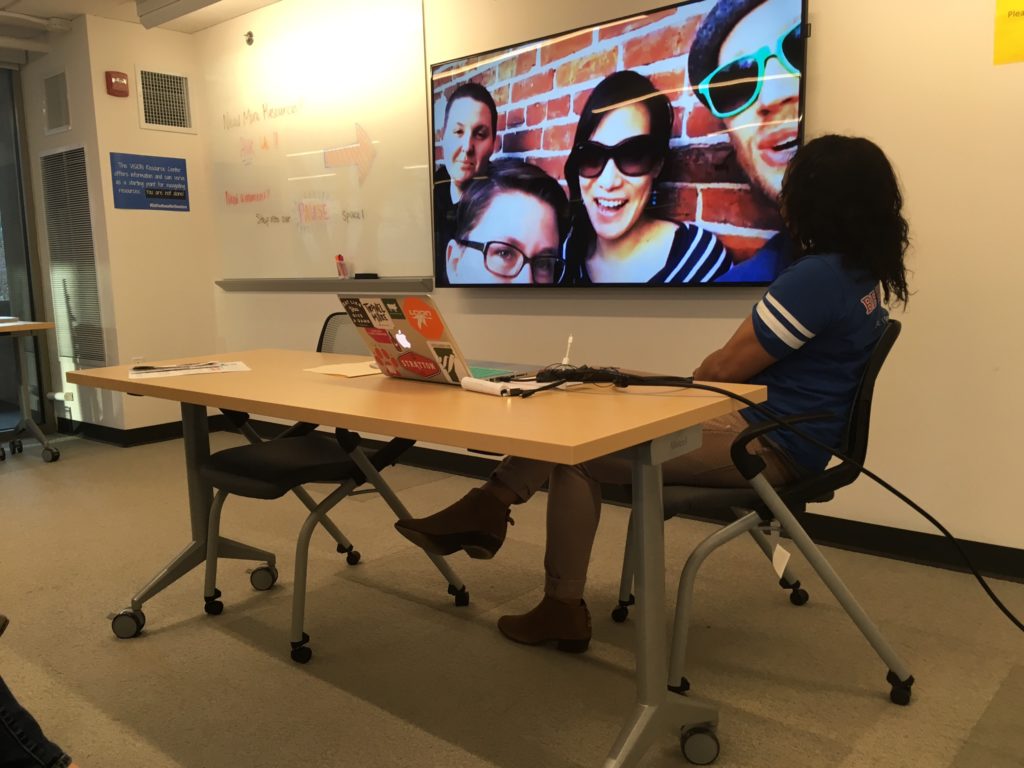NU event highlights resources for LGBTQA+ sexual violence survivors
April 19, 2017
Students learned about resources available to LGBTQA+ survivors of sexual violence at Friday’s “Break the Silence” event at Northeastern’s Center for Intercultural Engagement.
Speakers outlined the different on and off-campus organizations that students could go to for help, and clarified which of those were confidential.
Ellie Williams, a staff programmer at the center and a senior journalism major, said she thought it was vital to hold the event to address the needs of sexual violence survivors who are part of the LGBTQA+ community.
“Unfortunately, spaces that are geared toward survivors are often carrying this narrative that men are rapists and women are vulnerable, and that’s the dynamic, although in reality we know that’s not true,” Williams said. “People of all genders, all sexual orientations get sexually assaulted, and it’s really not okay to be leaving people out in the cold.”
The event was co-sponsored by four Northeastern student groups: The Sexual Assault Response Coalition (SARC), Pan Asian American Queer Alliance, Feminist Student Organization and NU Pride. It included a guest speaker from Boston Gay and Lesbian Adolescent Social Services (GLASS), a local group that offers services to LGBTQA+ youth of color.
Alex Cestone, vice president of SARC and a junior political science and business administration combined major, said if a survivor is still in danger, they should call the Northeastern University Police Department (NUPD).
“If you are on campus, you have literally just been assaulted and you need to get somewhere safe, they are the quickest responders,” she said.
However, Cestone cautioned calling NUPD if a survivor is not in immediate danger because NUPD officers are mandated reporters, which means they are required to report an instance of sexual violence and conduct an investigation with Northeastern’s Title IX office.
Most employees on campus are mandated reporters, including investigators in the Title IX office, counselors at the Violence Support, Intervention and Outreach Network (ViSION) Resource Center and all professors.
If a student survivor of sexual violence wants to discuss the incident or find more information without reporting the incident, Cestone said there are fewer options.
Confidential locations include the Center for Spirituality, Dialogue and Service a student may wish to talk to through the center. University Health and Counseling Services, the Title IX office and ViSION all have responsible employees, so they are not entirely confidential.
Both the Title IX office and ViSION have employees who are mandated reporters, and UHCS employees can report an incident if they feel a student is a threat to themselves or others. For this, Cestone recommended students talk to the offices in vague language so they can get more information without having the incident reported.
Cestone said students who are uncomfortable talking to NUPD officers also have the option to talk to their resident assistant (RA), but that the RA will bring the case to NUPD.
“They are not by any means the most direct way to get any help,” Cestone said. “The reason I include this is because some people, especially younger students who are not super comfortable with officers, they’re more comfortable typically with their RAs and the RA has the training to respond to a disclosure. They [the RA] will ultimately just call NUPD or go up the ranks to NUPD, but they can provide you support in the meantime.”
After reporting sexual violence, if students need assistance switching classes or moving residence hall rooms, they can contact ViSION or visit its Resource Center at 106 St. Stephen St.
When students are off campus, they can call 911 for assistance and the Boston Police Department will respond, Cestone said. If the student chooses to go to the hospital, they can see a sexual assault nurse examiner (SANE).
“A SANE nurse can do a rape kit, which can be used in an investigation if you choose to do one via criminal court,” Cestone said. “A SANE nurse can kind of walk you through your options and then they will perform any exams you agree to.”
She also said the hospital may call the Boston Area Rape Crisis Center, a local service to assist survivors of sexual violence, to get an advocate to help the survivor and discuss options and offer support throughout the process.
“They can go to court hearings with you, they can provide you counseling, they can give you information, they can do a lot,” Cestone said.
Jennifer Turner, the mentorship program coordinator at Boston GLASS, said the event organizers reached out to her to talk about GLASS’s trauma informed approach. Boston GLASS works with youth from ages 13 to 25 and focuses on providing support for the local youth.
“One thing that we do there is foster this sense of community,” Turner said. “We focus just letting this all acceptance of folks gender identities, gender expression, pronouns.”
GLASS has behavioral health services, counseling services, HIV and sexually transmitted disease testing, youth leadership opportunities and more. Ultimately, Turner said, they try to help those who need it.
“Trauma is something that affects all communities,” Turner said. “Sadly, we see it a lot more within the LGBT community.”
Confidential resources* for survivors of sexual assault, courtesy of SARC:
On campus:
University Health and Counseling Services: 617-373-2772
Center for Spirituality, Dialogue and Service: 617-373-2728
Off campus:
Boston Area Rape Crisis Center Hotline: 1-800-841-8371
The Network/La Red Hotline: 617-742-4911
Violence Recovery Program at Fenway Health: 617-927-6250
Victim Rights Law Center: 617-399-6720
Other (non-confidential) resources for survivors of sexual assault:
ViSION Resource Center: 106 St. Stephen St.; Hours: 9 a.m. – 5 p.m., Monday – Friday
Mark Jannoni, Assistant Vice President for Title IX Initiatives and Title IX Coordinator: 617-373-3543
Your resident assistant or residence director
*Confidential resources are individuals or groups that are not considered mandated reporters. Mandated reporters, or non-confidential resources, must report all incidents of sexual crimes to NUPD as soon as they are made aware of them.







